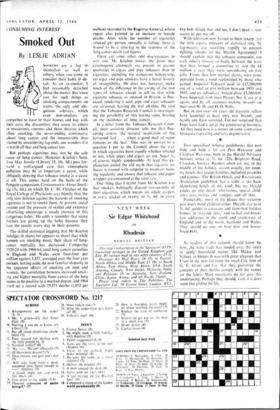CONSUMING INTEREST
Smoked Out
By LESLIE ADRIAN But perhaps cigarettes may not be the sole cause of lung cancer. Harcourt Kitchin's book You May Smoke (Library 33, 10s. 6d.) puts for- ward a well-argued case that atmospheric pollution may be as important a cause, while obliquely denying that tobacco smoke is a cause at all. This comes hard on the heels of the Penguin symposium, Commonsense About Smok- ing (3s. 6d.), in which Dr C. M. Fletcher of the Royal College of Physicians says bluntly that 'the only sure defence against the hazards of smoking cigarettes is not to smoke them. At present, social custom and the pressure of skilled and extensive Avertising encourage a steady increase in this dangerous habit.' He adds a reminder that many doctors are giving up the habit because they face the results every day in their patients.
The skilful statistical juggling that Mr Kitchin indulges in shows (or appears to show) that while women are smoking more, their share of lung- cancer mortality has decreased. Comparing 1920-24 with 1960-64, total lung cancer casualties in England and Wales were four-four per million against 1,357, averaged over the four-year periods. Setting aside.the now familiar disparity in the apparent effects of smoking on men and women, the correlation between increased smok- ing and higher mortality from cancer of the lung seems to be positive to a marked degree, and 1964 itself set a record with 25,371 deaths (1,852 per
Million) recorded by the Registrar-General, whose repast also pointed to an increase in female deaths. Also, while the number of cigarettes smoked per person annually is falling, there is bound to be a time-lag in the response of the lung cancer death rate figures
There are some other odd discrepancies to sort out. Mr Kitchin makes the point that carcinogenic chemicals are present in greater quantities in cigars and pipe tobaccos than in cigarettes, including the dangerous ben/p■ rene, yet cigar and pipe smokers have a better history of susceptibility. He does not, however, make much of the difference in the curing of the two types of tobacco, except to tell us that while cigarette tobacco, as smoked in Britain. is flue- cured, rendering it acid, pipe and cigar tobaccos are air-cured, leaving the leaf alkaline. He says that the Tobacco Research Council is investigat- ing the possibility of this having some bearing on the incidence of lung cancer.
In a letter from the Tobacco Research Coun- cil, their assistant director tells me that flue- curing arrests 'the natural respiration of the harvested leaf . . . when a good deal of sugar remains in the leaf.' This was in answer to a question I put to the Council about the way in which cigarettes burn rapidly whether inhaled or not, while pipes and cigars go out. Sugar is, of course, highly combustible. At least this ex- planation ended the old myth that cigarette to- bacco is treated with saltpetre to maintain burn- ing regularity and ensure that tobacco and paper wrapper are consumed at the same rate.
One thing that I learnt from Mr Kitchin was that smokers habitually discard two-sevenths of their cigarettes, which means six whole gaspers in every packet of twenty or Is. 6d. in every five bob. Given that and tax, I don't need user scares to put me off.
With television now barred to them (excep for the little cigars. innocent of statistical sin), 'he fag-makers are reverting rapidly to coupon lighting (shades of the Martin Agreement). I should explain that the tobacco companies cut each other's throats so badly between the wars that they formed a committee to stop the £4 million a year they were squandering on free gifts. Firms that lost market shares were com- pensated from a fund replenished by those who gained. Imperial Tobacco paid in £13,500,000 out of a total of £14 million between 1933 and 1945,, and its subsidiary Ardath drew £3,500.000. Now Imperial, with their Players No. 6, are at it again, and by all accounts making inroads on their own W. D. and H. 0. Wills.
But in just over six years the cigarette sellers have launched at least sixty new brands, and hardly any have survived. I'm not surprised that Imps have had a go at the potato-crisp business. All they need now is a report on some connection between crisp eating and fatty degeneration.


































 Previous page
Previous page